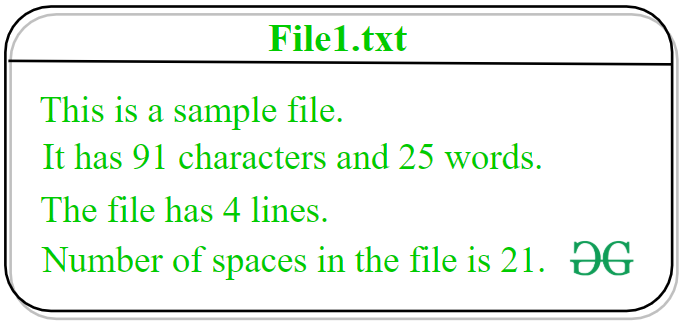Python – 获取文件中的字符数、单词数、空格数和行数
先决条件: Python中的文件处理
给定一个文本文件fname ,任务是计算文件中字符、单词、空格和行的总数。
众所周知, Python提供了多种用于处理文件的内置功能和模块。让我们讨论使用Python计算文件中字符、单词、空格和行总数的不同方法。

方法#1:天真的方法
在这种方法中,想法是通过开发我们自己的逻辑来解决任务。在不使用Python的任何内置函数的情况下,将计算文件的字符总数、单词数、空格数和行数。
在这种方法中,想法是通过开发我们自己的逻辑来解决任务。在不使用Python的任何内置函数的情况下,将计算文件的字符总数、单词数、空格数和行数。
下面是上述方法的实现。
# Python implementation to compute
# number of characters, words, spaces
# and lines in a file
# Function to count number
# of characters, words, spaces
# and lines in a file
def counter(fname):
# variable to store total word count
num_words = 0
# variable to store total line count
num_lines = 0
# variable to store total character count
num_charc = 0
# variable to store total space count
num_spaces = 0
# opening file using with() method
# so that file gets closed
# after completion of work
with open(fname, 'r') as f:
# loop to iterate file
# line by line
for line in f:
# incrementing value of
# num_lines with each
# iteration of loop to
# store total line count
num_lines += 1
# declaring a variable word
# and assigning its value as Y
# because every file is
# supposed to start with
# a word or a character
word = 'Y'
# loop to iterate every
# line letter by letter
for letter in line:
# condition to check
# that the encountered character
# is not white space and a word
if (letter != ' ' and word == 'Y'):
# incrementing the word
# count by 1
num_words += 1
# assigning value N to
# variable word because until
# space will not encounter
# a word can not be completed
word = 'N'
# condition to check
# that the encountered character
# is a white space
elif (letter == ' '):
# incrementing the space
# count by 1
num_spaces += 1
# assigning value Y to
# variable word because after
# white space a word
# is supposed to occur
word = 'Y'
# loop to iterate every
# letter character by
# character
for i in letter:
# condition to check
# that the encountered character
# is not white space and not
# a newline character
if(i !=" " and i !="\n"):
# incrementing character
# count by 1
num_charc += 1
# printing total word count
print("Number of words in text file: ", num_words)
# printing total line count
print("Number of lines in text file: ", num_lines)
# printing total character count
print('Number of characters in text file: ', num_charc)
# printing total space count
print('Number of spaces in text file: ', num_spaces)
# Driver Code:
if __name__ == '__main__':
fname = 'File1.txt'
try:
counter(fname)
except:
print('File not found')
输出:
Number of words in text file: 25
Number of lines in text file: 4
Number of characters in text file: 91
Number of spaces in text file: 21
方法#2:使用一些内置函数和 OS 模块函数
在这种方法中,想法是使用 OS 模块的os.linesep()方法来分隔当前平台上的行。当解释器的扫描仪遇到os.linesep时,它会将其替换为\n 字符。之后, strip()和split()函数将用于执行任务。
进一步了解strip()和split()函数。
下面是上述方法的实现。
# Python implementation to compute
# number of characters, words, spaces
# and lines in a file
# importing os module
import os
# Function to count number
# of characters, words, spaces
# and lines in a file
def counter(fname):
# variable to store total word count
num_words = 0
# variable to store total line count
num_lines = 0
# variable to store total character count
num_charc = 0
# variable to store total space count
num_spaces = 0
# opening file using with() method
# so that file gets closed
# after completion of work
with open(fname, 'r') as f:
# loop to iterate file
# line by line
for line in f:
# separating a line
# from \n character
# and storing again in line
# variable for further operations
line = line.strip(os.linesep)
# splitting the line
# to make a list of
# all the words present
# in that line and storing
# that list in
# wordlist variable
wordslist = line.split()
# incrementing value of
# num_lines with each
# iteration of loop to
# store total line count
num_lines = num_lines + 1
# incrementing value of
# num_words by the
# number of items in the
# list wordlist
num_words = num_words + len(wordslist)
# incrementing value of
# num_charc by 1 whenever
# value of variable c is other
# than white space in the separated line
num_charc = num_charc + sum(1 for c in line
if c not in (os.linesep, ' '))
# incrementing value of
# num_spaces by 1 whenever
# value of variable s is
# white space in the separated line
num_spaces = num_spaces + sum(1 for s in line
if s in (os.linesep, ' '))
# printing total word count
print("Number of words in text file: ", num_words)
# printing total line count
print("Number of lines in text file: ", num_lines)
# printing total character count
print("Number of characters in text file: ", num_charc)
# printing total space count
print("Number of spaces in text file: ", num_spaces)
# Driver Code:
if __name__ == '__main__':
fname = 'File1.txt'
try:
counter(fname)
except:
print('File not found')
输出:
Number of words in text file: 25
Number of lines in text file: 4
Number of characters in text file: 91
Number of spaces in text file: 21
在评论中写代码?请使用 ide.geeksforgeeks.org,生成链接并在此处分享链接。